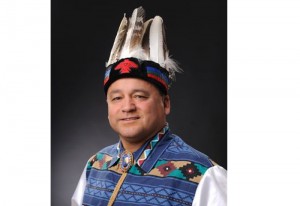OTTAWA—
“I for one don’t feel as positive about the outcome as some of the chiefs,” Grand Council Chief Patrick Madahbee said. “The government has ideas about advancing the economic development of our communities, but then uses legislative acts such as the privatization of lands and transparent governance that hinders the process.”
Deputy Grand Chief Glen Hare said he wouldn’t go so far as saying the event was historic as “there was nothing in the prime minister’s speech, nothing. At least the Governor General acknowledged the treaties.”
When asked about Governor General David Johnston’s opening speech and the state of the Covenant Chain—a series of alliances and treaties involving First Nations tribes and the British colonies dating back to the 1600s that were honoured with the gifting of a wampum belt—Chief Madahbee said the chain “needs to be polished.” This fact was never stated directly during the remarks of the day, but in a fitting gesture, National Chief Shawn Atleo presented Mr. Johnston with a silver wampum belt, shiny and new, not tarnished and rusted, symbolic of the original relationship between the two groups.
During the opening ceremonies, the wampum belt was carried into the forum backwards.
“As we turn the belt we symbolically recognize that the issue of our relationship with the Crown is not correct,” said Chief Isadore Day Wiindawtegoweinini of the Serpent River First Nation. “And we must turn that belt and provide recognition of the work that still needs to be done. This really is at the foundation of the messaging behind this meeting with the federal government.”
Chief Madahbee thought the very room the gathering was held in was representative of the meeting.
“They put us in a small room and it was all very controlled,” he said. “I do give the prime minister some credit, however. He stuck around for the meetings afterwards. The optics of him leaving were largely criticized, so I give him full marks for that.”
Chief Madahbee spoke about the Royal Proclamations of 1763, recognizing the title of all lands traditionally occupied by First Nations people and the Crown treaties. “The problem is,” he said, “we’re dealing with Canada, not the Crown, and they’re not recognizing treaties like they were supposed to. Lord Denning (chief justice of the British Court of Appeal in the late 1960s) said the Crown had obligations to fulfill the treaties.”
“They will be able to say that their rights and freedoms have been guaranteed to them by the Crown—originally by the Crown in respect of the United Kingdom—now by the Crown in respect of Canada—but, in any case by the Crown,” Lord Denning wrote. “No Parliament should do anything to lessen the worth of these guarantees. They should be honoured by the Crown in respect of Canada ‘so long as the sun rises and the river flows.’ That promise must never be broken.”
“If we implemented the Kelowna Accord, The Royal Commission on Aboriginal Peoples, the Neilsen Report, the Harvard Project on American Indian Economic Development, recognized Commissioner Sidney Linden’s recommendations following the Ipperwash Inquiry and so on, we wouldn’t be in this situation in the first place,” he said. “The government has a real opportunity to do something. The eyes of the world are watching. Islanders and other members of the Anishnabek Nation were there, watching in the cold.”
“There’s a lot of strength among the First Nations,” Chief Madahbee added. “These guys (government officials) come and go, but First Nations people aren’t going anywhere.”
Chief Hare repeated those sentiments, saying, “We’ve been around, myself going on 26 years (in politics). These guys just come and go, but we keep our leadership roles for a long time.”
He said he didn’t think the gathering was “a complete waste of time,” but thought he would give the prime minister’s office a year to really see what comes to fruition. “Right now, it’s all in limbo,” Chief Hare added, noting that there has been no word as of yet on the creation of committees to deal with the six points to be addressed as formed in the Crown-First Nations outcome statement: improving relationships and strong partnerships respectful of treaty rights; building effective, appropriate, transparent and fully accountable governance structures; empowering success of individuals and self-sustainable communities; creating conditions to accelerate economic development opportunities and maximize benefits for all Canadians; and respecting the role of First Nations’ culture and language in our history and future.
“I’m going to sit down and cross my fingers that something good will come out of Ottawa,” Chief Hare said. “Nothing happens overnight, especially for us.”
Chief Madahbee said he had a chance to address the economic session during the afternoon and talked about the endeavours of the communities of the Anishnabek Nation.
“$80 million goes into the surrounding towns (of First Nations communities) on Manitoulin—money paid for goods and services such as police, health, education budgets, etcetera,” he continued, noting that during his time as chief with the Aundeck Omni Kaning (AOK) First Nation, AOK and Sheguiandah First Nation were jointly responsible for a $2 million influx into the then-Manitoulin School Board. “We were pumping $2 million into the school board, but they wanted to get rid of the Ojibwe class because it was costing $10,000. We threatened to set up a temporary school and were ready to ask the government to build us a school when they changed their minds about the $10,000 pretty quick.”
Chief Madahbee said he supported the national chief’s view of the Indian Act, that it needs to disappear.
“When will they wake up and smell the coffee?” he asked of the federal government. “Unless we’re fully engaged, it will never work. The solution is, we have to implement the treaties. They don’t understand, we’re Anishnabek—they can’t change us. I don’t know why they try. This is just strengthening our resolve, it makes us more determined.”



